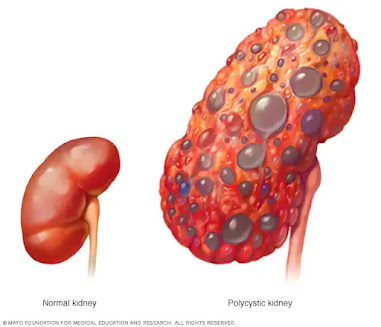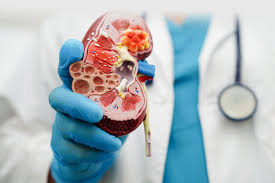Kidney Diseases
Kidney diseases encompass a broad spectrum of conditions that affect the structure and function of the kidneys, vital organs responsible for filtering waste and excess fluids from the blood to produce urine. These diseases can range from acute, reversible conditions to chronic, progressive disorders that may lead to kidney failure. Here's a detailed overview of kidney diseases, covering types, causes, symptoms, diagnosis, treatment, and prevention:
Types of Kidney Diseases
1. Chronic Kidney Disease (CKD):
- CKD is a long-term condition where kidneys gradually lose their ability to function over time. It is often associated with conditions like diabetes, hypertension, and glomerulonephritis. CKD progresses through stages based on the kidneys' glomerular filtration rate (GFR).
2. Acute Kidney Injury (AKI):
- AKI is a sudden and often reversible loss of kidney function, typically caused by factors such as severe infection (sepsis), dehydration, medications (e.g., NSAIDs, antibiotics), or obstruction in the urinary tract.
3. Glomerular Diseases:
- Conditions affecting the glomeruli (tiny filtering units in the kidneys) include glomerulonephritis, where inflammation of these structures can lead to impaired kidney function.
4. Polycystic Kidney Disease (PKD):
- PKD is a genetic disorder where fluid-filled cysts develop in the kidneys, gradually replacing normal kidney tissue and impairing function.
5. Kidney Stones:
- Kidney stones are hard deposits of minerals and salts that can form within the kidneys or urinary tract. They can cause severe pain, blockages, and infections.
6. Urinary Tract Infections (UTIs):
- UTIs can affect the kidneys (pyelonephritis) if bacteria ascend from the bladder into the upper urinary tract, potentially causing kidney damage if untreated.
Causes of Kidney Diseases
-Diabetes: High blood sugar levels over time can damage the kidneys (diabetic nephropathy).
- Hypertension: Prolonged high blood pressure can strain the kidneys and lead to kidney damage.
- Autoimmune Disorders: Conditions like lupus and IgA nephropathy can cause immune system attacks on the kidneys.
- Genetic Factors: Inherited conditions such as PKD and Alport syndrome can lead to kidney disease.
- Medications and Toxins: Certain medications (NSAIDs, antibiotics) and toxins (heavy metals, solvents) can damage kidney function.
- Infections-: Bacterial infections affecting the kidneys (pyelonephritis) can cause acute kidney injury.
Symptoms of Kidney Diseases
- Fatigue, weakness
- Swelling (edema) in legs, ankles, or around the eyes
- Decreased urine output or changes in urine appearance (color, foamy urine)
- Shortness of breath, difficulty concentrating
- Nausea, vomiting, loss of appetite
- Persistent itching
- High blood pressure
Diagnosis of Kidney Diseases
- Blood Tests: Measure creatinine and blood urea nitrogen (BUN) levels to assess kidney function.
- Urine Tests: Check for proteinuria (excess protein in urine), hematuria (blood in urine), and other abnormalities.
- Imaging: Ultrasound, CT scan, or MRI to visualize the kidneys and detect abnormalities.
- Kidney Biopsy: In some cases, a small sample of kidney tissue is taken for examination under a microscope to diagnose specific kidney diseases.
Treatment of Kidney Diseases
- Medications: Manage underlying conditions like diabetes and hypertension; treat infections and inflammation; control symptoms.
- Dietary Changes: Adjustments in diet to manage electrolyte imbalances and reduce workload on kidneys.
-Dialysis: Artificially filters blood (hemodialysis or peritoneal dialysis) when kidneys can no longer perform this function adequately.
- Kidney Transplant: Surgical replacement of a failing kidney with a healthy donor kidney in end-stage kidney disease.
Prevention of Kidney Diseases
- Manage underlying health conditions like diabetes and hypertension through medication, lifestyle changes, and regular medical check-ups.
- Avoid excessive use of medications known to be harmful to kidneys.
- Maintain a healthy weight, balanced diet (low in salt, processed foods, and saturated fats), and regular physical activity.
- Stay hydrated and avoid smoking and excessive alcohol consumption.
Conclusion
In conclusion, kidney diseases are diverse and can significantly impact health and quality of life. Early detection, management of underlying conditions, and lifestyle changes are key to preventing progression and complications associated with kidney disease. Regular medical monitoring and adherence to treatment plans are crucial for managing kidney health effectively.





Comments
Post a Comment